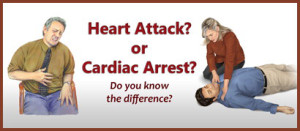
on the sixth day of Christmas my true love gave to me.
An aspirin and trip to A &E.

So Heart attack!!!! What do you think of when you hear those two words? For most Those two words fill people with Fear. As soon as you hear heart attack, immediately they think of death. Quite rightly because if you do not recognise the symptoms it can rapidly lead to a cardiac arrest.

What is the difference between a heart attack and cardiac arrest?
a popular misconception is that they are one in the same. This is not true, whilst they are linked they are also two different entities.

Heart Attack
A heart attack happens when there is a narrowing/blockage in the arteries supplying blood to the heart muscle itself. The heart like any other muscle in the body needs a good supply of oxygen rich blood to survive. If this flow is interrupted then the muscle cells start to die making the heart less efficient in pumping. Eventually if this is not rectified it will stop completely (cardiac arrest).

Cardiac Arrest
A cardiac arrest is time critical and immediately life threatening condition. It can be caused by a number of factors including drugs, trauma and heart attacks. A cardiac arrest is defined as the cessation of the heart pumping blood around the body.
Signs and symptoms of a Heart Attack.
Heart attack symptoms vary from one person to another. The most common signs of a heart attack are:
chest pain
Chest tightness
heaviness in the chest
pain or a burning feeling in your chest
pain in arms
neck
jaw
back or stomach
for some people, the pain or tightness is severe, while other people just feel uncomfortable also they may experience
sweating
feeling light-headed
become short of breath
feeling nauseous or vomiting.
grey looking skin
clammy
Watch how quickly it can happen, it can happen anywhere and to anyone.
these symptoms are not exhaustive and if you suspect someone is having a heart attack you need to ring 999 for an ambulance.

Treatment
Call 999 or 112 for an ambulance and tell them you think someone is having a heart attack.
Make the person comfortable,
help move them into the most comfortable position.
The best position is on the floor leaning against a wall with knees bent and head and shoulders supported.
This should ease the pressure on their heart and stop them hurting themselves if they collapse.
Give them a 300mg aspirin, if available make sure they are not allergic to it by asking them, and tell them to chew it slowly.
Be aware that they may become unresponsive and collapse before help arrives if this happens
If they lose responsiveness at any point, stay clam and open their airway, check their breathing, and prepare to treat someone who has become unresponsive. You may need to do CPR. Cardio-pulmonary resuscitation at a rate of 30 chest compressions to 2 breaths.

Be Safe…………
Advertisements Share this:




